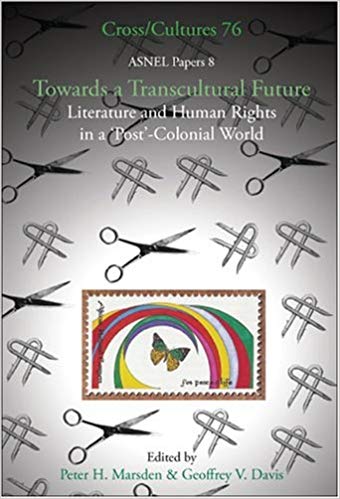
“This well produced book contains much of value…”
NELM News, Vol.45, December 2006.
Studying postcolonial literatures in English can (and indeed should) make a human rights activist of the reader – there is, after all, any amount of evidence to show the injustices and inhumanity thrown up by processes of decolonization and the struggle with past legacies and present corruptions. Yet the human-rights aspect of postcolonial literary studies has been somewhat marginalized by scholars preoccupied with more fashionable questions of theory.
The present collection seeks to redress this neglect, whereby the definition of human rights adopted is intentionally broad. The volume reflects the human rights situation in many countries from Mauritius to New Zealand, from the Cameroon to Canada. It includes a focus on the Malawian writer Jack Mapanje.
The contributors’ concerns embrace topics as varied as denotified tribes in India, female genital mutilation in Africa, native residential schools in Canada, political violence in Northern Ireland, the South African Truth and Reconciliation Commission, and the discourse of the Treaty of Waitangi. The editors hope that the very variety of responses to the invitation to reflect on questions of “Literature and Human Rights” will both stimulate further discussion and prompt action.
Table of Contents
Acknowledgements
Introduction
Letter from Mary Robinson’s office
Jack Mapanje’s address to the conference
Letter from Dr. Hastings Banda
James GIBBS: Still in Bounds
James GIBBS: The Back-Seat Critic and the Front-Line Poet: The Case of Jack Mapanje, Scholar, Teacher, Poet, Detainee, Exile
Ahmed SALEH: Interview with Jack Mapanje
Edward O. AKO: Nationalism in Recent Cameroon Anglophone Literature
Hilarious N. AMBE: The Anglophone-Francophone Marriage and Anglophone Dramatic Compositions in the Cameroon Republic
Wumi RAJI: Ken Saro-Wiwa’s “Four Farcical Plays” and the Postcolonial Imagination
Karen KING-ARIBISALA: Picnic at Ekpe
Don MATTERA: Sea and sand
Sindiwe MAGONA: Reading from To My Children’s Children
Lesego RAMPOLOKENG: A play, this land is the stage
Lesego RAMPOLOKENG: The Fela Sermon (for Thomas Brückner)
Chantal ZABUS: Between Rites and Rights: Excision on Trial in African Women’s Texts and Human Contexts
Chandra CHATTERJEE: Anita Desai: The Compulsions of a Cosmetic Setting
J.U. JACOBS: Reconciling Languages in Antjie Krog’s Country of My Skull
Johannes A. SMIT: When ‘Trek’, ‘Gulf’ and ‘Guilt’ Go
Stuart MARLOW: The Dramaturgy of Political Violence: Challenges to Accepted Notions of Dramatic Discourse
Ken ARVIDSON: Testing Our Limits: Regionalism, Nationalism, and Selfhood in the Anglophone Literature/s of Oceania
Dieter RIEMENSCHNEIDER: “Governor high up, up, up, and Te Kemara down low, small, a worm, a crawler”: The political and
poetic discourse of the Treaty of Waitangi
Robert SULLIVAN: Chippewa Band of Nawash First Nation, Cape Croker Reservation, Georgian Bay, Canada
Robert SULLIVAN: Literature and Human Rights
Jamie S. SCOTT: Residential Schools and Native Canadian Writers
Lee MARACLE: Raven Understood
Mark SHACKLETON: Monique Mojica’s Princess Pocahontas and the Blue Spots and Thomas King’s Green Grass, Running Water: Countering
Misrepresentations of ‘Indianness’ in Recent Native North American Writing
Maggie Ann BOWERS: Eco-Criticism in a (Post-)Colonial Context and Leslie Marmon Silo’s Almanac of the dead
Lindsey COLLEN: Darkness, the Mother of
G.N. DEVY: For a Nomad called Thief
Rajiva WIJESINHA: Richard de Zoysa: His Life, Some Work…and a Death
Peter O. STUMMER: The New Cultural Divide: The Image of China and the Chinese (Literary) Diaspora
Jogamaya BAYER: Is the Coming of Justice Infinitely Deferred?
Gallery of Contributors and Subjects
Notes on Contributors.
